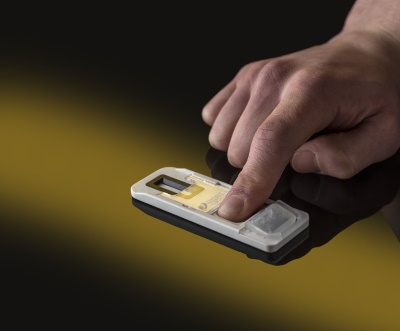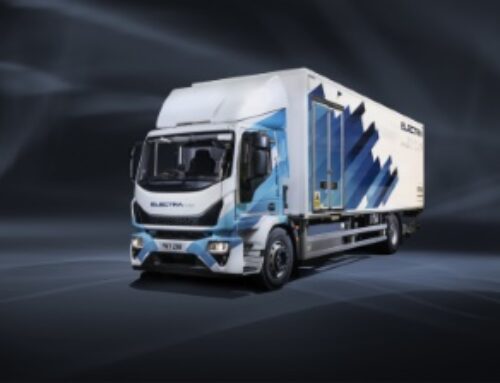Intelligent Fingerprinting: removing drug test barriers
 Intelligent Fingerprinting has explained how its portable testing technology can help transport operators clear some of the hurdles inherent in introducing workplace drug testing policies.
Intelligent Fingerprinting has explained how its portable testing technology can help transport operators clear some of the hurdles inherent in introducing workplace drug testing policies.
For transport operators, the impact of current heightened levels of drug driving can be significant, says the company, particularly when considering the potential reputational damage should an employee cause an accident.
“Already challenged by the complexities of driver recruitment in today’s post-lockdown world, transport operators simply can’t afford to run the risk of drivers breaching health and safety policies by working when under the influence of drugs,” said Terry Elvin, head of UK sales at Intelligent Fingerprinting.
“This is particularly the case as the age demographic evolves and businesses work to recruit younger drivers. While recent government figures suggest that around nine per cent of adults between the ages of 16 and 59 have taken a drug, that figure rises to 20.3 per cent within the 16 to 24 age group.”
While employee drug testing obviously has an important role to play in terms of promoting health and safety within the workplace, says Terry, implementing an effective drug screening programme can prove challenging when using traditional point-of-care testing approaches that involve the collection of urine or saliva samples.
“With the pressure on managers to keep their drivers on the road, the time involved in preparing for and collecting urine or saliva tests – with shy bladders and dry mouths to contend with – can be prohibitive to regular screening,” he continued.
“Those involved in testing often find traditional tests unhygienic and unpleasant to handle, and also potentially difficult to administer should the need to re-instate social distancing for Covid-19 be required again.”
That’s why transport operators need to think carefully about selecting the drug testing approach that best meets their own specific requirements, he contends.
“Anyone involved in testing drivers – whether for pre-employment screens, on-the-spot testing, or post-incident or for cause investigations – will already know that urine or saliva testing can be time-consuming, undignified and potentially unhygienic.
“Urine-based tests may need to be observed – requiring gender-specific staff and specially-prepared collection areas – making it difficult for operators to carry out spontaneous or off-site tests.
“And although saliva testing is much simpler and more versatile than urine screening, saliva can still prove difficult to collect should an individual have a dry mouth – often a common side effect of many drugs.
“If transport operators are to remove some of the barriers for fitness to work testing, then it’s clear that a simpler, quicker and less invasive approach to workplace drug testing is needed.”
 Operators look for a testing approach that takes all frustration and delays out of drug screening, says Terry; what many compliance teams want is to be able to turn up on-site just before the shift starts with a test that drivers can take immediately, and that can produce guaranteed results while waiting.
Operators look for a testing approach that takes all frustration and delays out of drug screening, says Terry; what many compliance teams want is to be able to turn up on-site just before the shift starts with a test that drivers can take immediately, and that can produce guaranteed results while waiting.
“That’s where fingerprint-based sweat drug testing comes in,” he continued.
“The portable testing system takes around ten minutes to screen for cocaine, cannabis, opiates and methamphetamine, and can be easily applied at either national depots, regional depots or even testing en route.
“All drivers need to do is use a small, tamper-evident drug screening cartridge to collect ten fingerprint sweat samples – taking less than a minute. The cartridge is the inserted into a portable analysis unit that reads the cartridge and provides a positive or negative result on-screen for all drugs in the test in ten minutes.
“The fact that a fingerprint drug testing is completely portable also means that the system can be easily deployed throughout the workplace, providing firms with a very responsive and practical way of supporting drug misuse policies in-house…
“Critically, fingerprint testing’s shorter window of detection provides a clearer insight into fitness for duty at the time of the test. Given that the whole purpose of drug testing is to determine fitness for work, it’s important that firms aren’t judgemental about their employees’ behaviour outside of work. Offering a shorter window of detection means that any employers are only testing for any very recent drug use that might impair an employee and their fitness for work.
“Finally, fingerprint testing’s discreet operation makes the whole testing process much more dignified for both the person being tested and the tester, with no requirement to collect invasive, biohazardous body fluid samples.”
 Goldstar Transport is among those operators that have chosen to switch out urine tests for fingerprint drug testing. The company, which employs approximately 600 LGV drivers, purchased six portable readers from Intelligent Fingerprinting and has been conducting random drug tests each month to adhere to FORS (Fleet Operator Recognition Scheme) guidelines, whilst also using the in-house system to support for cause testing.
Goldstar Transport is among those operators that have chosen to switch out urine tests for fingerprint drug testing. The company, which employs approximately 600 LGV drivers, purchased six portable readers from Intelligent Fingerprinting and has been conducting random drug tests each month to adhere to FORS (Fleet Operator Recognition Scheme) guidelines, whilst also using the in-house system to support for cause testing.
Nick Tolley, driver compliance manager and Midlands depot manager for Goldstar Transport, said: “We’ve now been using it for around four months, and everyone prefers it over the old urine tests. Intelligent Fingerprinting’s approach is much more hygienic and less intrusive for both our employees as well as those in charge of the testing.
“It takes less time so has less impact on productivity – saving 5-10 minutes on each test soon adds up! Drivers consistently provide a fingerprint sweat sample, so we aren’t subject to the delays due to not being able to gather a sample etc, and we have on site results with one of our six in-house scanners in 10 minutes.
“In comparison to the urine tests where we were equipped with gaffer tape, toilet blue and rubber gloves, Intelligent Fingerprinting is a lot more straightforward!”










